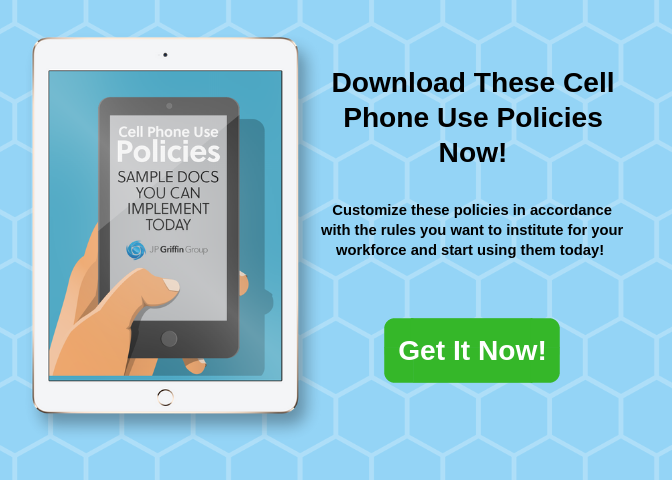 Now that nearly every adult has a smartphone, employers are realizing the need to develop policies that address cell phone use at work. As useful and helpful as our handheld devices are (and we do use them for everything), they can be distracting, and at times, a security risk.
Now that nearly every adult has a smartphone, employers are realizing the need to develop policies that address cell phone use at work. As useful and helpful as our handheld devices are (and we do use them for everything), they can be distracting, and at times, a security risk.
In many ways, employers have helped foster this problem. Many employers expect their workforce to always be available, which makes it hard to tell employees they can’t use their cell phones at certain times or in certain settings at work. It might sound a bit hypocritical of us to make such demands and then tell employees they’re on their phones too much. All of us — from the top of the organization down — have gotten so used to a device in our hands that it gets admittedly difficult to put it down.
Cell Phone Use at Work and How it Affects Productivity
A survey conducted by staffing firm OfficeTeam found that employees spend about 56 minutes per day using their cell phones for personal business while at work. While managers surveyed assumed their employees were looking at social media, many employees said they were actually reading and responding to personal emails. In addition, 58 percent of workers reported using their cell phones to visit websites that were blocked or banned by their employer.
Regardless of how employees are using their cell phones at work, it’s a good idea for employers to have a policy regarding the matter, as excessive use can (and will) decrease productivity. We can probably all admit that, at some point or another, we’ve gone down a rabbit hole on our phones while at work, and perhaps, may have been so engrossed that we missed something a supervisor told us to do or have given an improper response which led to problems later on.
Creating a Cell Phone Use Policy
It’s unrealistic to expect employees to never use their cell phones at work. Most people will feel the need to keep their phones close in case of emergency — especially those with children or elderly parents. Having a cell phone use policy could help people understand what’s expected of them, but a no-tolerance policy will likely feel punitive and overbearing.
For example, United by Blue expects their employees to spend their workdays focused on work, but they understand their employees have lives outside of work and that sometimes it’s necessary to answer the phone and communicate with non work-related people, like babysitters and home contractors. This expectation is communicated to employees, who are expected to respect the policy and for the most part, they do.
Maple Holistics incorporates common sense and politeness in their cell phone use policy. According to company spokesperson Nate Masterson, their policy is “quite simple — so long as it’s an important call, or you limit yourself to very brief sessions (no more than 2 or 3 minutes at a time), you’re free to use your phone in the office. However, we generally advise employees to keep their phones on silent (so as not to bother their fellow coworkers).”
 Another important aspect to consider is the safety of your workforce. Last year, natural gas and electric provider NiSource implemented a policy prohibiting the use of cell phones while driving. Having less distractions means their employees (as well as other drivers on the road) are safer. According to Dave Monte, Senior Vice President of Safety, Environmental and Training, 2016 was their safest year yet and once the 2017 numbers are finalized, it’s likely to be even safer.
Another important aspect to consider is the safety of your workforce. Last year, natural gas and electric provider NiSource implemented a policy prohibiting the use of cell phones while driving. Having less distractions means their employees (as well as other drivers on the road) are safer. According to Dave Monte, Senior Vice President of Safety, Environmental and Training, 2016 was their safest year yet and once the 2017 numbers are finalized, it’s likely to be even safer.
The bottom line is that it’s important to find a balance that acknowledges the reality of cell phone use at work and considers the liabilities distractions can create, while making your wishes for limiting cell phone use known to all employees. This could mean cell phones are hidden from view during meetings unless necessary — like if a calendar needs to be consulted, if someone needs to refer to an email, or a question requires Google to be answered.
This is a more pressing matter if your company deals with proprietary or copywritten materials. You can’t have employees taking pictures or recording audio (or worse, video) when you’re discussing sensitive information because if it were to get out, your company could be vulnerable to lawsuits. For this reason, many employers have recorded device policies. If sensitive material is being discussed or displayed, cell phones are to be left outside of the room to make sure secrets cannot be stolen or accidentally leaked.
Curbing Cell Phone Use at Work
Many employers don’t create a policy regarding cell phone use at work until they realize they have a problem, which can be weeks, months, or even years into a downward spiral of problems. Like it or not, it’s necessary to have a cell phone use policy at this point. It doesn’t have to be incredibly long or detailed, but it should incorporate the unique nature of your business (such as security or safety concerns).
As the examples above demonstrate, issues that affect some businesses may not affect others. Safety concerns aren’t necessarily a problem in an office setting, but perhaps your employees are spending more time on their phones that you’d like.
There’s nothing wrong with laying out a policy clearly telling your employees how you’d like them to use their cell phones during work hours. Perhaps limiting phone calls to emergency-only is a reasonable solution. You could ask employees to keep their phones in desk drawers on vibrate. If you’re in a setting that involves heavy interaction with the public (like retail or service), you could ask employees to keep their phones in their lockers.
If you’re looking for a sample policy to follow, Better Team has some good templates. You can start there and then tailor the policies to align with the best interests of your company. But regardless of the policy, it needs to apply to everyone from the top down. If lower level employees see the CEO disobeying policy, they probably won’t be interested in following it themselves.
 Do you have a policy regarding cell phone use at work? Leave us a comment below or contact us. We’d love to hear what’s working (or not working) for you.
Do you have a policy regarding cell phone use at work? Leave us a comment below or contact us. We’d love to hear what’s working (or not working) for you.
















